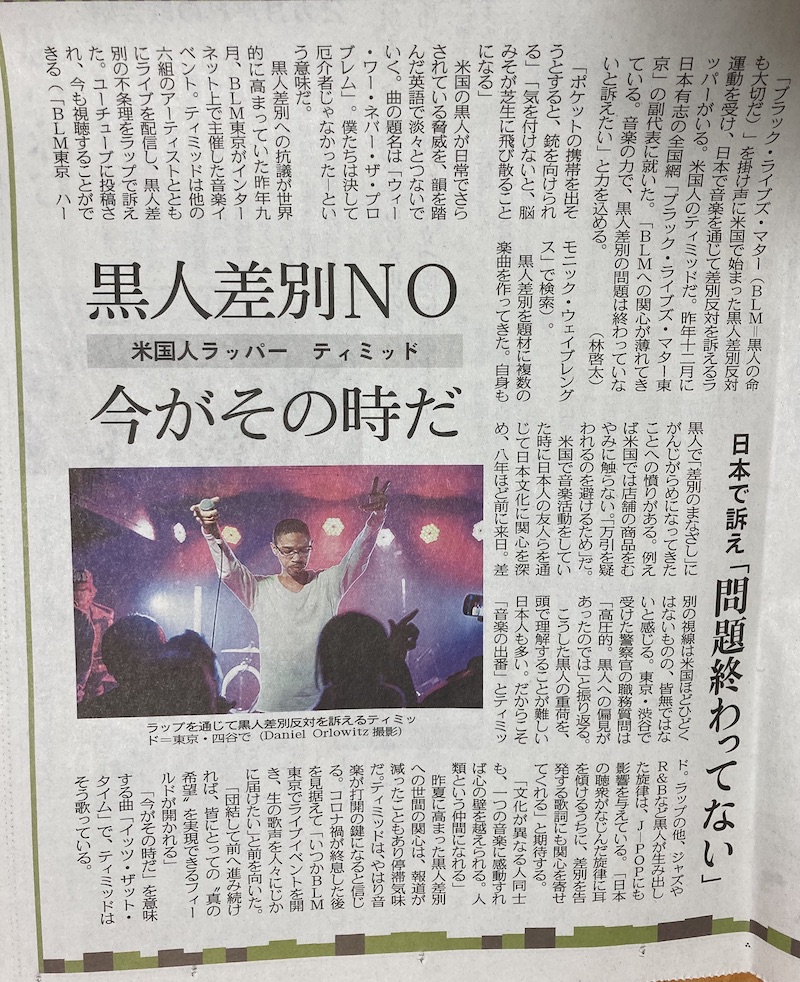
Way back in October I interviewed with Chunichi Newspaper in Nagoya, Japan. The interview has finally been published and I have received my copy. I sat with the interviewer to discuss music, my participation with BLM Tokyo, the music event Harmonic Wavelength that we produced, anti-black racism in the U.S. and experiences in Japan. The large print basically says “No to anti-black racism. American rapper Timid [quoting my lyrics] ‘It’s That Time'”.
Dope fact: that lyric that was quoted was from the chorus of a collab I did with the amazing Lin Que.
English translation (DeepL computer AI translation below).
Photo credit Dan Orlowitz.
10月に中日新聞とインタビューしました。やっと記事が掲載されました。ブラック・ライヴズ・マター 東京のHarmonic Wavelengthの参加したイベント、音楽の活動、アンチブラックネス、アメリカと日本に起った黒人差別の経験の事を話しました。
日本語:https://www.google.co.jp/amp/s/www.chunichi.co.jp/amp/article/224956S
Following the movement against discrimination against black people that started in the U.S. with the slogan “Black Lives Matter (BLM),” there is a rapper in Japan who appeals against discrimination through music. He is Timid, an American. Last December, he became the vice president of Black Lives Matter Tokyo, a nationwide network of Japanese volunteers. He said, “Interest in BLM is waning. With the power of music, I want to appeal that the problem of discrimination against blacks is not over. Keita Hayashi
If you try to take your phone out of your pocket, a gun will be pointed at you, and if you’re not careful, your brains will be splattered all over the lawn.
The threats that black people in the U.S. are exposed to on a daily basis are connected in rhyming English in an unhurried manner. The title of the song is “We Were Never the Problem”. The title of the song is “We Were Never the Problem,” meaning that we were never the problem.
Last September, when protests against discrimination against black people were growing worldwide, BLM Tokyo organized a music event on the Internet. Timid, along with six other artists, delivered a live performance, rapping about the absurdity of black racism. The video was posted on YouTube and can still be viewed (search for “BLM Tokyo Harmonic Wavelengths”).
He has written several songs on the subject of discrimination against blacks. He has written several songs about discrimination against blacks, and is angry about the fact that he himself is black and has been strangled by the “gaze of discrimination. For example, in the U.S., people do not touch products in stores. In the U.S., for example, people don’t touch products in stores without permission, “to avoid being suspected of shoplifting.
While working as a musician in the U.S., he developed an interest in Japanese culture through his Japanese friends and came to Japan about eight years ago. Although the discrimination is not as severe as in the U.S., I feel that it is not unheard of. A police officer questioning me in Shibuya, Tokyo, said, “He was very coercive. I think they were prejudiced against black people,” he recalls.
Many Japanese find it difficult to comprehend the burden of black people. That is why Timid says, “This is where music comes in. In addition to rap, the melodies created by blacks in jazz and R&B are also influencing J-Pop. He hopes that as Japanese audiences listen to the familiar melodies, they will also pay attention to the lyrics that accuse them of discrimination.
I hope that as Japanese audiences listen to the familiar melodies, they will also pay attention to the lyrics that condemn discrimination. We can become friends as human beings.
Public concern about discrimination against blacks, which increased last summer, has stagnated due to a decrease in media coverage. Timid believes that music will be the key to breaking the ice. Looking ahead to after the Corona disaster is over, he said, “I would like to hold a live event at BLM Tokyo someday and deliver my voice directly to the people.
“If we continue to move forward in unity, a field will open up for us to realize our ‘true hope’ for everyone.”
That’s what Timid sings in the song “It’s That Time.
